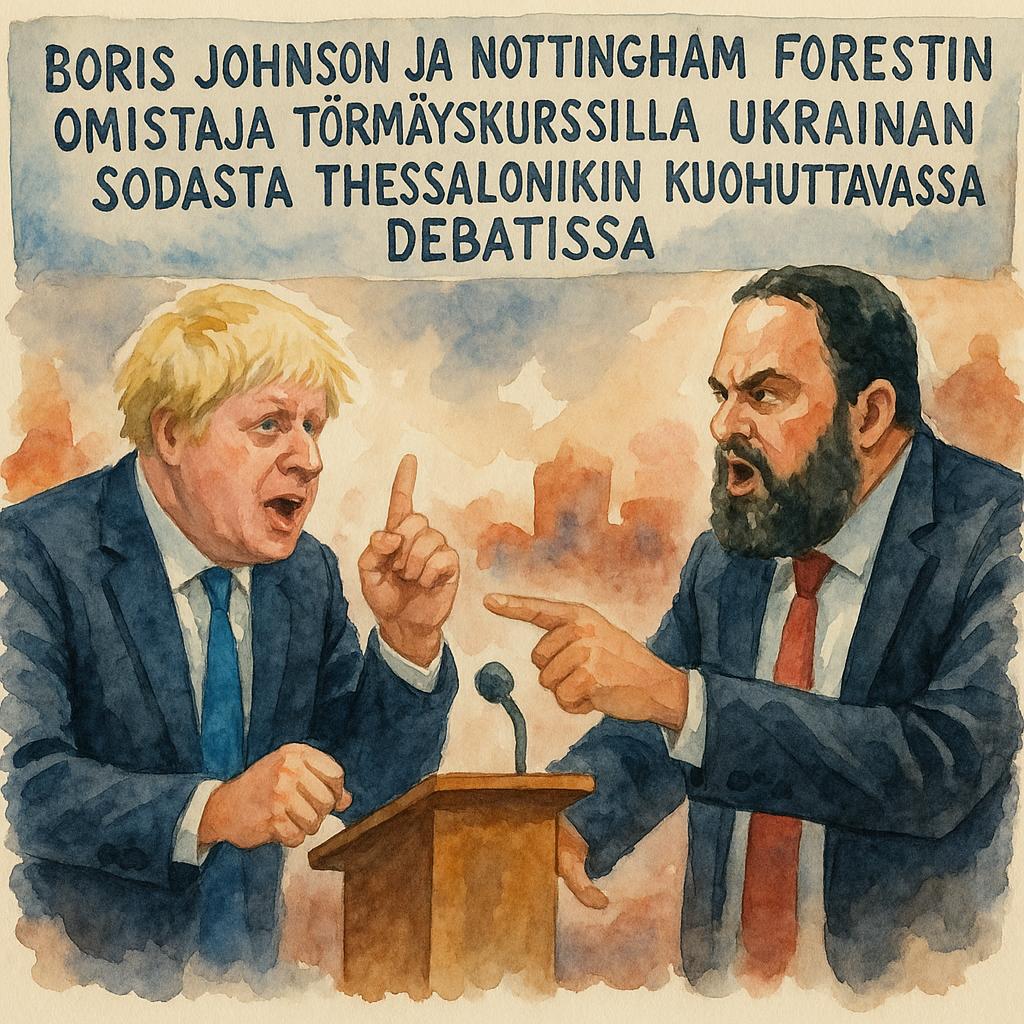Boris Johnson ja Nottingham Forestin omistaja törmäyskurssilla Ukrainan sodasta Thessalonikin kuohuttavassa debatissa
It was supposed to be another polished conference panel — smart suits, tidy soundbites, a little high‑level debate for the audience. Instead, Thessaloniki hosted a fiery moment that has since ricocheted across newsfeeds around the world. At the heart of it? Evangelos Marinakis, billionaire owner of Nottingham Forest and Olympiakos, who waded straight into one of the most sensitive questions of our time: how to stop Russia’s war in Ukraine.
Marinakis suggested that maybe – just maybe – peace could come if Ukraine agreed to give up some of its land to Moscow. For him, the equation was simple: fewer bombs, fewer funerals, fewer children killed.
“Wouldn’t it be better,” he said, “if the war ended and Russia kept part of Ukraine’s territory?” In Marinakis’s view, that would count as a “fair compromise.”
But before the words had even settled, the man sitting beside him on stage — former British Prime Minister Boris Johnson — pounced.
Johnson’s history lesson
Johnson cut him off with a thunderous question: “How much of Czechoslovakia would you have given to Hitler?”
The retort dragged the audience back to 1938, when Western powers struck the Munich Agreement, handing Hitler control of the Sudetenland in the hope of “peace.” Within a year, Europe was at war anyway. Johnson’s point was blunt: appeasement doesn’t stop aggressors — it emboldens them.
Marinakis tried to hold his ground. Russia, he insisted, wasn’t Nazi Germany, and today’s conflict wasn’t the same as the Second World War. Johnson didn’t budge an inch, warning that history will always repeat itself if its lessons are ignored.
A clash that spilled far beyond the stage
The exchange became the conference’s headline moment. Social media lit up almost instantly: some accused Marinakis of being dangerously naïve, while others argued that — uncomfortable as it sounded — he was at least pushing for an end to human suffering rather than endless battle lines.
Adding another layer of complexity: Nottingham Forest currently has Ukraine’s vice‑captain, Oleksandr Zinchenko, in its ranks on loan from Arsenal. How does he feel, hearing his club owner suggest Ukraine should cede land to the very country that invaded it? For a Premier League side, operating under the full glare of global attention, this is not a small question.
When football meets geopolitics
This is the dilemma modern football clubs face. Owners aren’t just background financiers anymore — their words carry weight well beyond the 90 minutes of play on Saturday. In a league that brands itself as the most global on earth, one remark in Thessaloniki can ripple through sponsors, locker rooms, fan bases, and entire nations.
So far, there aren’t any obvious repercussions for Nottingham Forest. But reputations in football are fragile, tied as much to perception and politics as to performance on the pitch. And with Marinakis’s comments still echoing online, the club finds itself caught in an uneasy intersection of sport and statesmanship.
The bigger takeaway
The question lingers: should sports bosses wade into the thorniest geopolitical debates of the day? Or should they stick to the safe ground of transfers, tactics, and ticket prices?
Marinakis clearly thought he was voicing compassion for the suffering in Ukraine. Johnson, ever the performer, turned it into a lecture on the dangers of weakness. Both men walked away having made their case — but only one got the thunderous applause.
Alternative headlines
- Forest Owner Suggests Ukraine Give Up Land — Johnson Fires Back with History
- “How Much for Hitler?”: Johnson Silences Marinakis in Heated Debate on Ukraine
- When Football Meets Geopolitics: Nottingham Boss Sparks Storm with Ukraine Comments
👉 What do you think: Was Marinakis offering a humane perspective, or walking into dangerous political quicksand? Could — or should — owners of big football clubs stay out of heavyweight world affairs?
